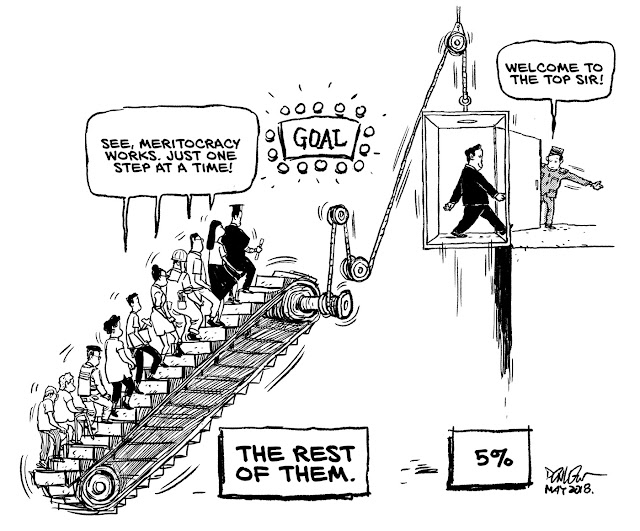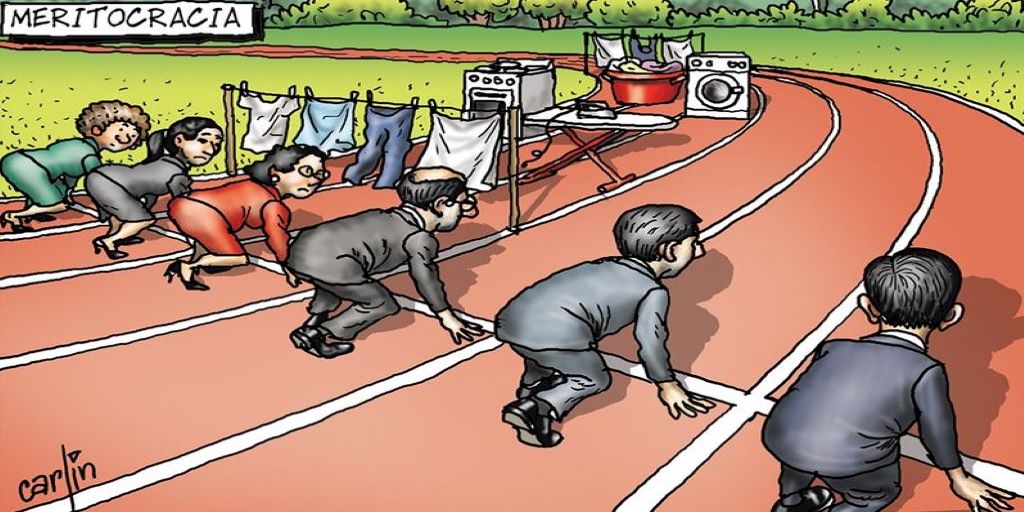The myth of the meritocracy
Meritocracy is the idea that people succeed based solely on their individual abilities, skills, and talents, rather than their social status, race, gender, or other personal characteristics. In theory, meritocracy is a fair and just system that rewards hard work and talent, while providing equal opportunities for everyone. However, the reality is that meritocracy is a myth because:
“Merit is defined by [people in power] to reward what [people in power] become. Merit, as we know it, explicitly values particular experiences and abilities – the ones developed by [people in power] – and therefore implicitly devalues others”.[1]
In other words, meritocracy is not a neutral or objective system, but rather one that is shaped by the values and experiences of those in power who can define merit and the standards by which success is measured.
The myth of meritocracy is perpetuated by those in power who benefit from the status quo. It ignores the role of power and privilege in shaping opportunities and outcomes and is often used to defend the status quo and to justify discrimination and inequality.
Those who benefit from the current system may argue that success is based solely on merit, and that those who have not achieved success simply did not work hard enough. This argument ignores the many barriers and challenges faced by people from marginalized backgrounds and places the blame for their lack of success on the individual, rather than on the systemic inequalities that shape their lives.
Also, those in power have the ability to shape the narrative and to create a system that favours certain groups of people and disadvantages others. For example, people in positions of power may decide that success is defined by academic achievement or work experience, which disadvantages those who come from marginalized backgrounds or those who have had limited access to education and job opportunities.
Moreover, power is a significant factor in determining who gets ahead in society. Power can take many forms, such as wealth, social connections, or institutional authority. Those who hold power have an advantage in the competition for success, as they are able to use their resources to gain an edge over others. For example, a wealthy person may be able to access better education and career opportunities, or they may be able to use their financial resources to network and build social connections or start a business. Similarly, institutional authority can be used to create and enforce rules that favour certain groups of people over others.
 Fish don’t concern themselves with the opinions of smaller fish
Fish don’t concern themselves with the opinions of smaller fish
The idea of meritocracy also ignores the role of structural inequalities in determining success. Structural inequalities, such as systemic racism and sexism, play a significant role in shaping the opportunities and experiences of different groups of people. These inequalities can manifest in many ways, such as unequal access to education, healthcare, and job opportunities. Structural inequalities also contribute to the persistence of poverty and social exclusion, which further limits the opportunities available to certain groups of people.
In summary, the myth of meritocracy is deeply flawed and perpetuated by those in power. Success is not based solely on merit, but is shaped by a complex interplay of power, privilege, luck and structural inequalities.
To build a more just and equitable society, we must recognize the role of power and privilege in shaping opportunities and outcomes, and work to dismantle the systems that perpetuate inequality. We must also work to create a more inclusive and equitable society, where everyone has access to the resources and opportunities they need to succeed. Only then can we create a truly meritocratic society, where success is based on ability, rather than on personal characteristics or social status.
Acknowledgements
The first draft of this blog was written by ChatGPT.
[1] Murray YM. Merit teaching. Hastings Constitutional Law Quarterly 1996; 23: 1073. P.1078 (from https://johnmenadue.com/the-myth-of-the-meritocracy-and-the-resistance-to-the-strengthening-medicare-taskforce-report/)

